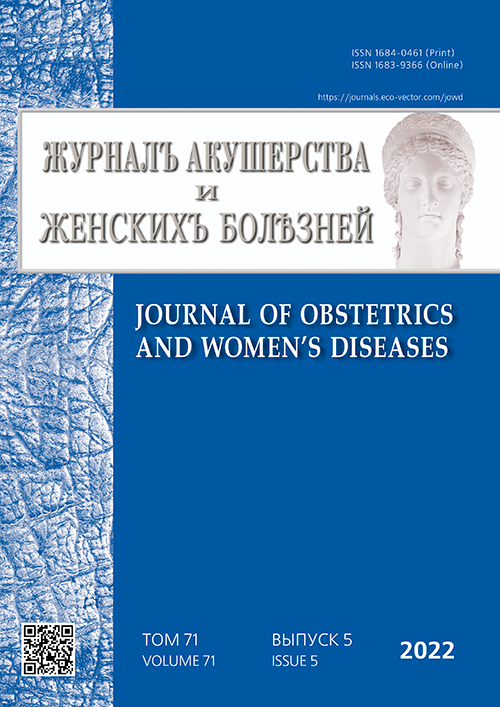Efficiency of intravenous therapy with Intralipid fat emulsion in patients with early reproductive loss
- 作者: Bespalova O.N.1, Zhernakova T.S.1, Selkov S.A.1, Chepanov S.V.1
-
隶属关系:
- The Research Institute of Obstetrics, Gynecology and Reproductology named after D.O. Ott
- 期: 卷 71, 编号 5 (2022)
- 页面: 21-28
- 栏目: Original study articles
- ##submission.dateSubmitted##: 15.09.2022
- ##submission.dateAccepted##: 13.10.2022
- ##submission.datePublished##: 18.12.2022
- URL: https://journals.eco-vector.com/jowd/article/view/110932
- DOI: https://doi.org/10.17816/JOWD110932
- ID: 110932
如何引用文章
详细
BACKGROUND: Immune mechanisms play a leading role in the pathogenesis of early reproductive loss. Modern methods of regulating disorders of immune homeostasis to overcome infertility and recurrent miscarriage include immune-efferent therapies such as immunocytotherapy, plasmapheresis, and intravenous administration of immunoglobulins and fat emulsions. Intralipid is the gold standard of the first generation parenteral fat emulsion that reduces the cytotoxicity of NK cells. In the literature, there are opposite data on the effectiveness of Intralipid fat emulsion in repeated implantation failure. This may be due to indications for its appointment and the choice of criteria for evaluating the effectiveness of this therapy.
AIM: The aim of this study was to evaluate the effect of Intralipid therapy on the onset of pregnancy in patients with a history of early reproductive loss.
MATERIALS AND METHODS: This prospective cohort study was conducted in Saint Petersburg, Russia in 2018–2021 and included 97 patients with a history of early reproductive loss (recurrent pregnancy loss or repeated In Vitro Fertilization failures). Patients were randomized into two study groups. The first group consisted of 41 women with Intralipid therapy, and the second group comprised 56 women without this therapy. Patients of the first group received 200 ml of Intralipid 20% (intravenous fat emulsion) once a month for three consecutive months before pregnancy. Inclusion criteria were ages 18 to 40 years, two cases of reproductive failure (pregnancy loss up to 12 weeks and / or unsuccessful In Vitro Fertilization attempts), and normal spouse karyotypes. Exclusion criteria were miscarriage due to fetal chromosomal abnormalities diagnosed by curettage and histopathological examination of products of conception from miscarriages, anatomical anomalies in the development of the genital apparatus, abnormal spouse karyotypes, and soy protein allergy. We evaluated anamnesis data and immunological parameters (functional activity of NK cells in peripheral blood before and after treatment). The efficacy of therapy was judged by the onset of pregnancy.
RESULTS: The Mann – Whitney U-test showed the difference in the levels of NKT cells before and after treatment with fat emulsions (p = 0.0076), this parameter decreasing 1.846 times compared to control. Clinical pregnancy in patients treated with Intralipid occurred twice as often compared to patients who did not receive fat emulsion therapy: 59.3% (n = 19) vs. 27.6% (n = 13), respectively (p = 0.0048).
CONCLUSIONS: Intralipid fat emulsion increases pregnancy rates by decreasing NKT cells in women with early reproductive loss.
全文:
作者简介
Olesya Bespalova
The Research Institute of Obstetrics, Gynecology and Reproductology named after D.O. Ott
Email: shiggerra@mail.ru
ORCID iD: 0000-0002-6542-5953
SPIN 代码: 4732-8089
Researcher ID: D-3880-2018
MD, Dr. Sci. (Med.)
俄罗斯联邦, Saint PetersburgTatyana Zhernakova
The Research Institute of Obstetrics, Gynecology and Reproductology named after D.O. Ott
编辑信件的主要联系方式.
Email: tatazhernakova@gmail.com
ORCID iD: 0000-0002-5131-4363
MD, PhD student
俄罗斯联邦, Saint PetersburgSergey Selkov
The Research Institute of Obstetrics, Gynecology and Reproductology named after D.O. Ott
Email: selkovsa@mail.ru
ORCID iD: 0000-0003-1560-7529
Scopus 作者 ID: 6507854443
Researcher ID: G-2059-2014
MD, Dr. Sci. (Med.), Professor, Honored Scientist of the Russian Federation
俄罗斯联邦, Saint PetersburgSergey Chepanov
The Research Institute of Obstetrics, Gynecology and Reproductology named after D.O. Ott
Email: chepanovsv@gmail.com
ORCID iD: 0000-0001-6087-7152
Scopus 作者 ID: 56399329700
Researcher ID: M-3471-2015
MD, Cand. Sci. (Med.)
俄罗斯联邦, Saint Petersburg参考
- Rai R, Regan L. Recurrent miscarriage. Lancet. 2006;368(9535):601−611. doi: 10.1016/S0140-6736(06)69204-0
- Makrigiannakis A, Petsas G, Toth B, et al. Recent advances in understanding immunology of reproductive failure. J Reprod Immunol. 2011;90(1):96−104. doi: 10.1016/j.jri.2011.03.006
- Wang F, Qualls AE, Marques-Fernandez L, et al. Biology and pathology of the uterine microenvironment and its natural killer cells. Cell Mol Immunol. 2021;18(9):2101−2113. doi: 10.1038/s41423-021-00739-z
- Zhernakova TS, Bespalova ON. The potential of micronutrient support with omega-3 and omega-6 fatty acids in the prevention of human reproductive disorders. Journal of Obstetrics and Women’s Diseases. 2021;70(6):91−104. doi: 10.17816/JOWD65052
- Roussev RG, Ng SC, Coulam CB. Natural killer cell functional activity suppression by intravenous immunoglobulin, intralipid and soluble human leukocyte antigen-G. Am J Reprod Immunol. 2007;57(4):262−269. doi: 10.1111/j.1600-0897.2007.00473.x
- Cuevas-Zuviría B, Mínguez-Toral M, Díaz-Perales A, et al. Structural dynamics of the lipid antigen-binding site of CD1d protein. Biomolecules. 2020;10(4):532. doi: 10.3390/biom10040532
- Roussev RG, Acacio B, Ng SC, et al. Duration of intralipid’s suppressive effect on NK cell’s functional activity. Am J Reprod Immunol. 2008;60(3):258−263. doi: 10.1111/j.1600-0897.2008.00621.x
- Ndukwe G. Recurrent embryo implantation failure after in vitro fertilisation: improved outcome following intralipid infusion in women with elevated T Helper 1 response. Hum. Fertil. 2011;14(2):1–88.
- Meng L, Lin J, Chen L, et al. Effectiveness and potential mechanisms of intralipid in treating unexplained recurrent spontaneous abortion. Arch Gynecol Obstet. 2016;294(1):29−39. doi: 10.1007/s00404-015-3922-8
- Plaçais L, Kolanska K, Kraiem YB, et al. Intralipid therapy for unexplained recurrent miscarriage and implantation failure: case-series and literature review. Eur J Obstet Gynecol Reprod Biol. 2020;252:100−104. doi: 10.1016/j.ejogrb.2020.06.017
- Check JH, Check DL. Intravenous intralipid therapy is not beneficial in having a live delivery in women aged 40−42 years with a previous history of miscarriage or failure to conceive despite embryo transfer undergoing in vitro fertilization-embryo transfer. Clin Exp Obstet Gynecol. 2016;43(1):14−15.
- Deepika K, Vohra A. Uterine NK cell activity in recurrent implantation failure role of intralipids. Fertil Steril. 2019;112(3)Suppl.:e105−e106. doi: 10.1016/j.fertnstert.2019.07.396.
- Rimmer MP, Black N, Keay S, et al. Intralipid infusion at time of embryo transfer in women with history of recurrent implantation failure: a systematic review and meta-analysis. J Obstet Gynaecol Res. 2021;47(6):2149−2156. doi: 10.1111/jog.14763
补充文件






